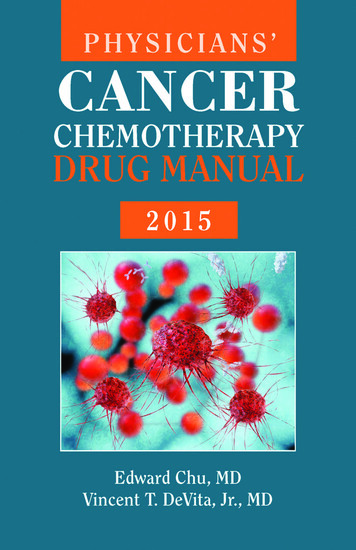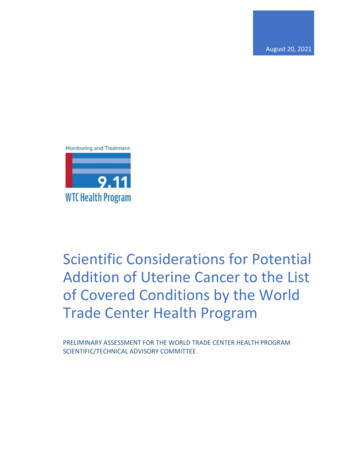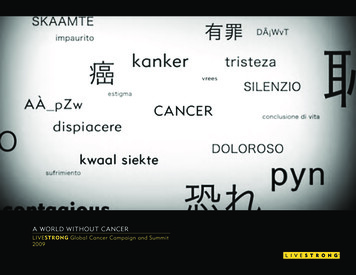
Transcription
Support for People with CancerChemotherapy and YouU.S. Department of Health & Human Services National Institutes of Health
About this BookChemotherapy and You is written for you—someone whois about to receive or is now receiving chemotherapy forcancer. Your family, friends, and others close to you mayalso want to read this book.This book is a guide you can refer to throughoutyour chemotherapy treatment. It includes facts aboutchemotherapy and its side effects and also highlightsways you can care for yourself before, during, and aftertreatment.Rather than read thisbook from beginning toend— look at only thosesections you need now.Later, you can alwaysread more.This book covers:Î Questions and answers about chemotherapy. Answers common questions, suchas what chemotherapy is and how it affects cancer cells.Î Side effects and ways to manage them. Explains side effects and other problemsthat may result from chemotherapy. This section also has ways that you and yourdoctor or nurse can manage these side effects.Î Tips for meeting with your doctor or nurse. Includes questions for you to thinkabout and discuss with your doctor, nurse, and others involved in your cancer care.Î Ways to learn more. Lists ways to get more information about chemotherapy andother topics discussed in this book—in print, online, and by telephone.Talk with your doctor or nurse about what you can expect during chemotherapy. He orshe may suggest that you read certain sections of this book or try some of the ways tomanage side effects.The Use of Product or Brand NamesProduct or brand names that appear in this book are for example only. The U.S. Government does not endorseany specific product or brand. If products or brands are not mentioned, it does not mean or imply that they arenot satisfactory.1-800-4-CANCER (1-800-422-6237)
Table of ContentsQuestions and Answers about Chemotherapy . 1Tips for Meeting with Your Doctor or Nurse . 8Your Feelings during Chemotherapy . 10About Side Effects . 12List of Side Effects . 13Anemia . 14Appetite Changes . 16Bleeding . 18Constipation . 20Diarrhea . 21Fatigue . 23Hair Loss . 25Infection . 27Infertility . 30Mouth and Throat Changes. 32Nausea and Vomiting . 35Nervous System Changes. 37Pain . 39Sexual Changes . 41Skin and Nail Changes . 44Urinary, Kidney, or Bladder Changes . 47Other Side Effects . 48www.cancer.govi
Foods to Help with Side Effects . 49Clear Liquids . 49Liquid Foods. 50Foods and Drinks that Are High in Calories and Protein . 51High-Fiber Foods . 52Low-Fiber Foods . 53Foods that Are Easy on a Sore Mouth. 54Foods that Are Easy on the Stomach. 55
Questions and Answers about ChemotherapyWhat is chemotherapy?Chemotherapy (also called chemo) is a type of cancertreatment that uses drugs to destroy cancer cells.How does chemotherapy work?Chemotherapy works by stopping or slowing the growth of cancer cells, which grow anddivide quickly. But it can also harm healthy cells that divide quickly, such as those that lineyour mouth and intestines or cause your hair to grow. Damage to healthy cells may causeside effects. Often, side effects get better or go away after chemotherapy is over.What does chemotherapy do?Depending on your type of cancer and how advanced it is, chemotherapy can:Cure cancer—when chemotherapy destroys cancer cells to the point that your doctor canno longer detect them in your body and they will not grow back.Control cancer—when chemotherapy keeps cancer from spreading, slows its growth, ordestroys cancer cells that have spread to other parts of your body.Ease cancer symptoms (also called palliative care)—when chemotherapy shrinks tumorsthat are causing pain or pressure.How is chemotherapy used?Sometimes, chemotherapy is used as the only cancer treatment. But more often, you will getchemotherapy along with surgery, radiation therapy, targeted therapy, or immunotherapy.Chemotherapy can:Î Make a tumor smaller before surgery or radiation therapy. This is called neo-adjuvantchemotherapy.Î Destroy cancer cells that may remain after surgery or radiation therapy. This is calledadjuvant chemotherapy.Î Help radiation therapy and immunotherapy work better.Î Destroy cancer cells that have come back (recurrent cancer) or spread to other parts ofyour body (metastatic cancer).www.cancer.gov1
How does my doctor decide which chemotherapy drugs to use?This choice depends on:Î The type of cancer you have. Some types of chemotherapy drugs are used for many typesof cancer. Other drugs are used for just one or two types of cancer.Î Whether you have had chemotherapy before.Î Whether you have other health problems, such as diabetes or heart disease.Where do I go for chemotherapy?You may receive chemotherapy during a hospital stay, at home, or in a doctor’s office, clinic,or outpatient unit in a hospital (which means you do not stay overnight). No matter whereyou go for chemotherapy, your doctor and nurse will watch for side effects and make anyneeded drug changes.Home Safety after Chemotherapy TreatmentsAfter receiving chemotherapy, you and your caregivers need to take special care to preventcontact with your body fluids. These fluids include urine, stools, sweat, mucus, blood, vomit,and those from sex. Your doctor or nurse will suggest home safety measures that you andyour caregivers should follow, such as:Î Closing the lid and flush twice after using the toilet.Î Sitting on the toilet to urinate, if you are male.Î Washing your hands with soap and water after using the restroom.Î Cleaning splashes from the toilet with bleach wipes.Î Using gloves when handling body fluids and washing your hands after removingthe gloves.Î Wearing disposable pads or diapers if incontinence is an issue and wearing gloveswhen handling.Î Washing linens soiled with body fluids separately.Î Using condoms during sex.The length of time that you and your caregivers need to follow these guidelines mightdiffer depending on the policy where you receive treatment and the drugs that you receive.Your doctor or nurse will tell you how long you and your caregivers need to practice thesesafety measures.21-800-4-CANCER (1-800-422-6237)
How often will I receive chemotherapy?Treatment schedules for chemotherapy vary widely. How often and how long you getchemotherapy depends on:Î Your type of cancer and how advanced it isÎ The goals of treatment (whether chemotherapy is used to cure your cancer, control itsgrowth, or ease the symptoms)Î The type of chemotherapyÎ How your body reacts to chemotherapyYou may receive chemotherapy in cycles. A cycle is a period of chemotherapy treatmentfollowed by a period of rest. For instance, you might receive one week of chemotherapyfollowed by three weeks of rest. These four weeks make up one cycle. The rest period givesyour body a chance to build new healthy cells.Can I miss a dose of chemotherapy?It is not good to skip a chemotherapy treatment. But sometimes your doctor or nurse maychange your chemotherapy schedule due to side effects you are having. If your schedulechanges, your doctor or nurse will explain what to do and when to start treatment again.How is chemotherapy given?Chemotherapy may be given in many ways.Î Injection. The chemotherapy is given by a shot in amuscle in your arm, thigh, or hip, or right under theskin in the fatty part of your arm, leg, or belly.Î Intra-arterial (IA). The chemotherapy goes directlyinto the artery that is feeding the cancer.Î Intraperitoneal (IP). The chemotherapy goesdirectly into the peritoneal cavity (the area thatcontains organs such as your intestines, stomach, liver, and ovaries).Î Intravenous (IV). The chemotherapy goes directly into a vein.Î Topical. The chemotherapy comes in a cream that you rub onto your skin.Î Oral. The chemotherapy comes in pills, capsules, or liquids that you swallow.www.cancer.gov3
Things to know about getting chemotherapy through an IVChemotherapy is often given through a thin needle that is placed in a vein on your handor lower arm. Your nurse will put the needle in at the start of each treatment and removeit when treatment is over. Let your doctor or nurse know right away if you feel pain orburning while you are getting IV chemotherapy.IV chemotherapy is often given through catheters or ports, sometimes with the helpof a pump.Catheters. A catheter is a soft, thin tube. A surgeon places one end of the catheter in alarge vein, often in your chest area. The other end of the catheter stays outside your body.Most catheters stay in place until all your chemotherapy treatments are done. Catheters canalso be used for drugs other than chemotherapy and to draw blood. Be sure to watch forsigns of infection around your catheter. For more information on Infection, see page 27.Ports. A port is a small, round disc made of plastic or metal that is placed under your skin.A catheter connects the port to a large vein, most often in your chest. Your nurse can inserta needle into your port to give you chemotherapy or draw blood. This needle can be left inplace for chemotherapy treatments that are given for more than 1 day. Be sure to watch forsigns of infection around your port. For more information on Infection, see page 27.Pumps. Pumps are often attached to catheters or ports. They control how much and howfast chemotherapy goes into a catheter or port. Pumps can be internal or external. Externalpumps remain outside your body. Most people can carry these pumps with them. Internalpumps are placed under your skin during surgery.How will I feel during chemotherapy?Chemotherapy affects people in different ways. How you feel depends on how healthy youare before treatment, your type of cancer, how advanced it is, the kind of chemotherapy youare getting, and the dose. Doctors and nurses cannot know for certain how you will feelduring chemotherapy.There are many ways to manage chemotherapy side effects. For more information, see theList of Side Effects section starting on page 13.41-800-4-CANCER (1-800-422-6237)
Can I work during chemotherapy?Many people can work during chemotherapy, as long as they match their schedule to howthey feel. Whether or not you can work may depend on what kind of work you do. If yourjob allows, you may want to see if you can work part-time or work from home on days youdo not feel well.Many employers are required by law to change your work schedule to meet your needsduring cancer treatment. Talk with your employer about ways to adjust your work duringchemotherapy. You can learn more about these laws by talking with a social worker.Can I take over-the-counterand prescription drugs whileI get chemotherapy?This depends on the type of chemotherapyyou get and the other types of drugs you planto take. Take only drugs that are approvedby your doctor or nurse. Tell your doctoror nurse about all the over-the-counterand prescription drugs you take, includinglaxatives, allergy medicines, cold medicines,pain relievers, aspirin, and ibuprofen.One way to let your doctor or nurse know about these drugs is by bringing in all your pillbottles. Your doctor or nurse needs to know:Î The name of each drugÎ The reason you take itÎ How much you takeÎ How often you take itTalk to your doctor or nurse before you take any over-the-counteror prescription drugs, vitamins, minerals, dietary supplements,or herbs.www.cancer.gov5
Can I take minerals, dietarysupplements, or herbs whileI get chemotherapy?Some of these products can change howchemotherapy works. For this reason, it isimportant to tell your doctor or nurseabout all the vitamins, minerals, dietarysupplements, and herbs that you takebefore you start chemotherapy. Duringchemotherapy, talk with your doctorbefore you take any of these products.How will I know if chemotherapy is working?Your doctor will give you physical exams and medical tests (such as blood tests and x-rays).He or she will also ask you how you feel.You cannot tell if chemotherapy is working based on its side effects. Some people think thatsevere side effects mean that chemotherapy is working well, or that no side effects mean thatchemotherapy is not working. The truth is that side effects have nothing to do with how wellchemotherapy is fighting your cancer.How much does chemotherapy cost?It is hard to say how much chemotherapy will cost. It depends on:Î The types and doses of chemotherapy usedÎ How long and how often chemotherapy is givenÎ Whether you get chemotherapy at home, in a clinic or office, or during a hospital stayÎ The part of the country where you live61-800-4-CANCER (1-800-422-6237)
Does my health insurance pay for chemotherapy?Talk with your health insurance company aboutwhat costs it will pay for. Questions to ask include:Î What will my insurance pay for?Î Do I need to call my insurance company beforeeach treatment for it to be covered? Or, does mydoctor’s office need to call?Î What do I have to pay for?Î Can I see any doctor I want or do I need tochoose from a list of preferred providers?Î Do I need a written referral to see a specialist?Î Is there a co-pay (money I have to pay) each time I have an appointment?Î Is there a deductible (certain amount I need to pay) before my insurance pays?Î Where should I get my prescription drugs?Î Does my insurance pay for all my tests and treatments, whether I am an inpatientor outpatient?How can I work with my insurance plan?Î Read your insurance policy before treatment starts to find out what your plan willand will not pay for.Î Keep records of all your treatment costs and insurance claims.Î Send your insurance company all the paperwork it asks for. This may include receiptsfrom doctors’ visits, prescriptions, and lab work. Be sure to also keep copies for yourown records.Î As needed, ask for help with the insurance paperwork. You can ask a friend, familymember, social worker, or local group such as a senior center.Î If your insurance does not pay for something you think it should, find out why theplan refused to pay. Then talk with your doctor or nurse about what to do next.He or she may suggest ways to appeal the decision or other actions to take.www.cancer.gov7
Tips for Meeting with Your Doctor or NurseMake a list of your questions before each appointment. Some people keep a“running list” and write down new questions as they think of them. Make sure to havespace on this list to write down the answers from your doctor or nurse.Bring a family member or trusted friend to your medical visits. This person canhelp you understand what the doctor or nurse says and talk with you about it after thevisit is over.Ask all your questions. There is no such thing as a stupid question. If you do notunderstand an answer, keep asking until you do.Take notes. You can write them down or use a tape recorder. Later, you can review yournotes and remember what was said.Ask for printed information about your type of cancer and chemotherapy.Let your doctor or nurse know how much information you want to know, whenyou want to learn it, and when you have learned enough. Some people want to learneverything they can about cancer and its treatment. Others only want a little information.The choice is yours.Find out how to contact your doctor or nurse in an emergency. This includes who tocall and where to go. Write important phone numbers in the spaces provided on the insidefront cover of this book.81-800-4-CANCER (1-800-422-6237)
Questions to AskAbout My CancerWhat kind of cancer do I have?What is the stage of my cancer?About Treatment with ChemotherapyWhy do I need chemotherapy?What is the goal of this chemotherapy?What are the benefits of chemotherapy?What are the risks of chemotherapy?How many cycles of chemotherapy will I get?How long between treatments?What types of chemotherapy will I get?How will these drugs be given?Where do I go for this treatment?How long does each treatment last?Other Questions about TreatmentAre there other ways to treat my type of cancer?What is the standard care for my type of cancer?Are there any clinical trials for my type of cancer?Should someone drive me to and from treatments?About Side EffectsWhat side effects can I expect right away?What side effects can I expect later?How serious are these side effects?How long will these side effects last?Will all the side effects go away when treatment is over?What can I do to manage or ease these side effects?What can my doctor or nurse do to manage or ease side effects?When should I call my doctor or nurse about these side effects?www.cancer.gov9
Your Feelings during ChemotherapyAt some point during chemotherapy, you may feel:Î FrustratedÎ DepressedÎ HelplessÎ AfraidÎ LonelyÎ AngryÎ AnxiousIt is normal to have a wide range of feelings while going through chemotherapy. After all,living with cancer and going through treatment can be stressful. You may also feel fatigue,which can make it harder to cope with your feelings.How can I cope with my feelings during chemotherapy?Relax. Find some quiet time and think of yourself in a favorite place. Breathe slowly orlisten to soothing music. This may help you feel calmer and less stressed. For more onrelaxation exercises, visit Learning to Relax on the National Cancer Institute’s web site axation.Exercise. Many people find that light exercise helps them feel better. There are many waysfor you to exercise, such as walking, riding a bike, and doing yoga. Talk with your doctor ornurse about ways you can exercise.Talk with others. Talk about your feelings with someone you trust. Choose someone whocan focus on you, such as a close friend, family member, chaplain, nurse, or social worker.You may also find it helpful to talk with someone else who is going through chemotherapy.Join a support group. Cancer support groups provide support for people with cancer.These groups allow you to meet others with the same problems. You will have a chance totalk about your feelings and listen to other people talk about theirs. You can find out how101-800-4-CANCER (1-800-422-6237)
others cope with cancer, chemotherapy, and sideeffects. Your doctor, nurse, or social worker mayknow about support groups near where you live.Some support groups also meet online (over theInternet), which can be helpful if you cannot travel.Talk to your doctor or nurse about things thatworry or upset you. You may want to ask aboutseeing a counselor. Your doctor may also suggestthat you take medication if you find it very hard tocope with your feelings.It’s normal to have a wide range of feelings during chemotherapy.After all, living with cancer and going through treatment canbe stressful.Ways to learn moreTo learn more about coping with your feelings and relationships during cancer treatment,read Taking Time: Support for People with Cancer, a booklet from the National CancerInstitute, available at ng-time.Cancer Support CommunityDedicated to providing support, education, and hope to people affected by cancer.Call: 1-888-793-9355Visit: www.cancersupportcommunity.orgE-mail: help@cancersupportcommunity.orgCancerCare, Inc.Offers free support, information, financial assistance, and practical help to people withcancer and their loved ones.Call: 1-800-813-HOPE (1-800-813-4673)Visit: www.cancercare.orgE-mail: info@cancercare.orgwww.cancer.gov11
About Side EffectsWhat are side effects?Side effects are problems caused by cancer treatment.Some common side effects from chemotherapy arefatigue, nausea, vomiting, decreased blood cell counts,hair loss, mouth sores, and pain.What causes side effects?Chemotherapy is designed to kill fast-growing cancer cells. But it can also affect healthy cellsthat grow quickly. These include cells that line your mouth and intestines, cells in your bonemarrow that make blood cells, and cells that make your hair grow. Chemotherapy causesside effects when it harms these healthy cells.Will I get side effects from chemotherapy?You may have a lot of side effects, some, or none at all. This depends on the type and amountof chemotherapy you get and how your body reacts. Before you start chemotherapy, talkwith your doctor or nurse about which side effects to expect.How long do side effects last?How long side effects last depends on your health and the kind of chemotherapy you get.Most side effects go away after chemotherapy is over. But sometimes it can take months oreven years for them to go away.Sometimes, chemotherapy causes long-term side effects that do not go away. These mayinclude damage to your heart, lungs, nerves, kidneys, or reproductive organs. Some types ofchemotherapy may cause a second cancer years later. Ask your doctor or nurse about yourchance of having long-term side effects.What can be done about side effects?Doctors have many ways to prevent or treat chemotherapy side effects and help you healafter each treatment session. Talk with your doctor or nurse about which ones to expect andwhat to do about them. Make sure to let your doctor or nurse know about any changes younotice—they may be signs of a side effect.The chart on the next page tells you where in this book to look for more information aboutspecific side effects.121-800-4-CANCER (1-800-422-6237)
List of Side EffectsBelow is a list of side effects that chemotherapy may cause.Not everyone gets every side effect. Which ones you have will depend on the type and doseof your chemotherapy and whether you have other health problems, such as diabetes orheart disease.Talk with your doctor or nurse about the side effects on this list. Ask which ones may affectyou. Mark the ones you may get and go to the pages listed to learn more.You may have a lot of side effects, some, or none at all.Anemia, see page 14Appetite Changes, see page 16Bleeding, see page 18Constipation, see page 20Diarrhea, see page 21Eye Changes, see page 48Fatigue, see page 23Flu-like symptoms, see page 48Fluid retention, see page 48Hair Loss, see page 25Infection, see page 27Infertility, see page 30Mouth and Throat Changes, see page 32Nausea and Vomiting, see page 35Nervous System Changes, see page 37Pain, see page 39Sexual Changes, see page 41Skin and Nail Changes, see page 44Urinary, Kidney, or Bladder Changes, see page 47www.cancer.gov13
Ways to Manage Side EffectsAnemiaWhat it is and why it occursRed blood cells carry oxygen throughout yourbody. Anemia is when you have too few red bloodcells to carry the oxygen your body needs. Yourheart works harder when your body does not getenough oxygen. This can make it feel like your heartis pounding or beating very fast. Anemia can alsomake you feel short of breath, weak, dizzy, faint, or very tired.Some types of chemotherapy cause anemia because they make it harder for bone marrow toproduce new red blood cells.Ways to manageGet plenty of rest. Try to sleep at least 8 hours each night. You might also want totake 1 to 2 short naps (1 hour or less) during the day.Limit your activities. This means doing only the activities that are most important to you.For example, you might go to work but not clean the house. Or you might order take-outfood instead of cooking dinner.Accept help. When your family or friends offer to help,let them. They can help care for your children, pick upgroceries, run errands, drive you to doctor’s visits, or doother chores you feel too tired to do.Eat a well-balanced diet. Choose a diet that containsall the calories and protein your body needs. Calories willhelp keep your weight up, and extra protein can help repairtissues that have been harmed by cancer treatment. Talk toyour doctor, nurse, or dietitian about the diet that is right for you.(To learn more, see Appetite Changes on page 16.)Stand up slowly. You may feel dizzy if you stand up too fast. When you get up from lyingdown, sit for a minute before you stand.141-800-4-CANCER (1-800-422-6237)
When you get up from lying down, sit for a moment beforeyou stand.Your doctor or nurse will check your blood cell count throughout your chemotherapy.You may need a blood transfusion if your red blood cell count falls too low. Your doctor mayalso prescribe a medicine to boost (speed up) the growth of red blood cells or suggest thatyou take iron or other vitamins.Call your doctor or nurse if:Î Your level of fatigue changes or you are not able to do yourusual activities.Î You feel dizzy or like you are going to faint.Î You feel short of breath.Î It feels like your heart is pounding or beating very fast.For more information on how to manage Fatigue that may be caused by anemia, see page 23.www.cancer.gov15
Ways to Manage Side EffectsAppetite ChangesWhat they are and why they occurChemotherapy can cause appetite changes. You may lose your appetite because of nausea(feeling sick to your stomach), mouth and throat problems that make it painful to eat, ordrugs that cause you to lose your taste for food. Appetite changes can also come fromfeeling depressed or tired. This problem may last for a day, a few weeks, or even months.It is important to eat well, even when you have no appetite. This means eating and drinkingfoods that have plenty of protein, vitamins, and calories. Eating well helps your body fightinfection and repair tissues that are damaged by chemotherapy. Not eating well can lead toweight loss, weakness, and fatigue.Some cancer treatments cause weight gain or an increase in your appetite. Be sure to askyour doctor, nurse, or dietitian what types of appetite changes you might expect and howto manage them.Ways to manageEat five to six small meals or snacks each day instead of three big meals. Manypeople find it easier to eat smaller amounts more often. Choose foods and drinks thatare high in calories and protein. See page 51 for a list of these foods.Set a daily schedule for eating your meals and snacks. Eat when it is time to eat,rather than when you feel hungry. You may not feel hungry while you are onchemotherapy, but you still need to eat.Drink milkshakes, smoothies,juice, or soup if you do notfeel like eating solid foods.Liquids like these can helpprovide the protein, vitamins,and calories your body needs.See page 50 for a list of LiquidFoods.161-800-4-CANCER (1-800-422-6237)
Use plastic forks and spoons. Some types of chemotherapy give you a metal taste in yourmouth. Eating with plastic can help decrease the metal taste. Cooking in glass pots and panscan also help.Increase your appetite by doingsomething active. For instance, youmight have more of an appetite if you takea short walk before lunch. Also, be carefulnot to decrease your appetite by drinkingtoo much liquid before or during meals.Change your rou
About this Book Chemotherapy and You is written for you—someone who . is about to receive or is now receiving chemotherapy for cancer. Your family, friends, and others close to you may . How you feel depends on how healthy you are before treatment, your type of cancer, how adva










